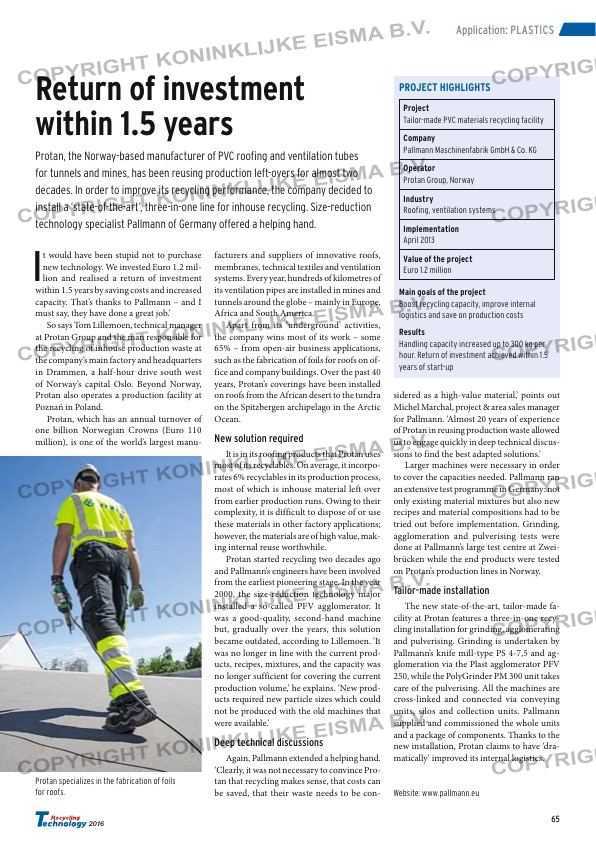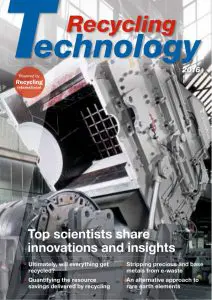Page 63 from: Recycling Technology 2016

65
2016
Application: PLASTICS
Return of investment
within 1.5 years
Protan, the Norway-based manufacturer of PVC roofing and ventilation tubes
for tunnels and mines, has been reusing production left-overs for almost two
decades. In order to improve its recycling performance, the company decided to
install a ‘state-of-the-art’, three-in-one line for inhouse recycling. Size-reduction
technology specialist Pallmann of Germany offered a helping hand.
I
t would have been stupid not to purchase
new technology. We invested Euro 1.2 mil-
lion and realised a return of investment
within 1.5 years by saving costs and increased
capacity. That’s thanks to Pallmann – and I
must say, they have done a great job.’
So says Tom Lillemoen, technical manager
at Protan Group and the man responsible for
the recycling of inhouse production waste at
the company’s main factory and headquarters
in Drammen, a half-hour drive south west
of Norway’s capital Oslo. Beyond Norway,
Protan also operates a production facility at
Poznań in Poland.
Protan, which has an annual turnover of
one billion Norwegian Crowns (Euro 110
million), is one of the world’s largest manu-
facturers and suppliers of innovative roofs,
membranes, technical textiles and ventilation
systems. Every year, hundreds of kilometres of
its ventilation pipes are installed in mines and
tunnels around the globe – mainly in Europe,
Africa and South America.
Apart from its ‘underground’ activities,
the company wins most of its work – some
65% – from open-air business applications,
such as the fabrication of foils for roofs on of-
fice and company buildings. Over the past 40
years, Protan’s coverings have been installed
on roofs from the African desert to the tundra
on the Spitzbergen archipelago in the Arctic
Ocean.
New solution required
It is in its roofing products that Protan uses
most of its recyclables. On average, it incorpo-
rates 6% recyclables in its production process,
most of which is inhouse material left over
from earlier production runs. Owing to their
complexity, it is difficult to dispose of or use
these materials in other factory applications;
however, the materials are of high value, mak-
ing internal reuse worthwhile.
Protan started recycling two decades ago
and Pallmann’s engineers have been involved
from the earliest pioneering stage. In the year
2000, the size-reduction technology major
installed a so-called PFV agglomerator. It
was a good-quality, second-hand machine
but, gradually over the years, this solution
became outdated, according to Lillemoen. ‘It
was no longer in line with the current prod-
ucts, recipes, mixtures, and the capacity was
no longer sufficient for covering the current
production volume,’ he explains. ‘New prod-
ucts required new particle sizes which could
not be produced with the old machines that
were available.’
Deep technical discussions
Again, Pallmann extended a helping hand.
‘Clearly, it was not necessary to convince Pro-
tan that recycling makes sense, that costs can
be saved, that their waste needs to be con-
sidered as a high-value material,’ points out
Michel Marchal, project & area sales manager
for Pallmann. ‘Almost 20 years of experience
of Protan in reusing production waste allowed
us to engage quickly in deep technical discus-
sions to find the best adapted solutions.’
Larger machines were necessary in order
to cover the capacities needed. Pallmann ran
an extensive test programme in Germany: not
only existing material mixtures but also new
recipes and material compositions had to be
tried out before implementation. Grinding,
agglomeration and pulverising tests were
done at Pallmann’s large test centre at Zwei-
brücken while the end products were tested
on Protan’s production lines in Norway.
Tailor-made installation
The new state-of-the-art, tailor-made fa-
cility at Protan features a three-in-one recy-
cling installation for grinding, agglomerating
and pulverising. Grinding is undertaken by
Pallmann’s knife mill-type PS 4-7,5 and ag-
glomeration via the Plast agglomerator PFV
250, while the PolyGrinder PM 300 unit takes
care of the pulverising. All the machines are
cross-linked and connected via conveying
units, silos and collection units. Pallmann
supplied and commissioned the whole units
and a package of components. Thanks to the
new installation, Protan claims to have ‘dra-
matically’ improved its internal logistics.
Website: www.pallmann.eu
PROJECT HIGHLIGHTS
Project
Tailor-made PVC materials recycling facility
Company
Pallmann Maschinenfabrik GmbH & Co. KG
Operator
Protan Group, Norway
Industry
Roofing, ventilation systems
Implementation
April 2013
Value of the project
Euro 1.2 million
Main goals of the project
Boost recycling capacity, improve internal
logistics and save on production costs
Results
Handling capacity increased up to 300 kg per
hour. Return of investment achieved within 1.5
years of start-up
Protan specializes in the fabrication of foils
for roofs.



